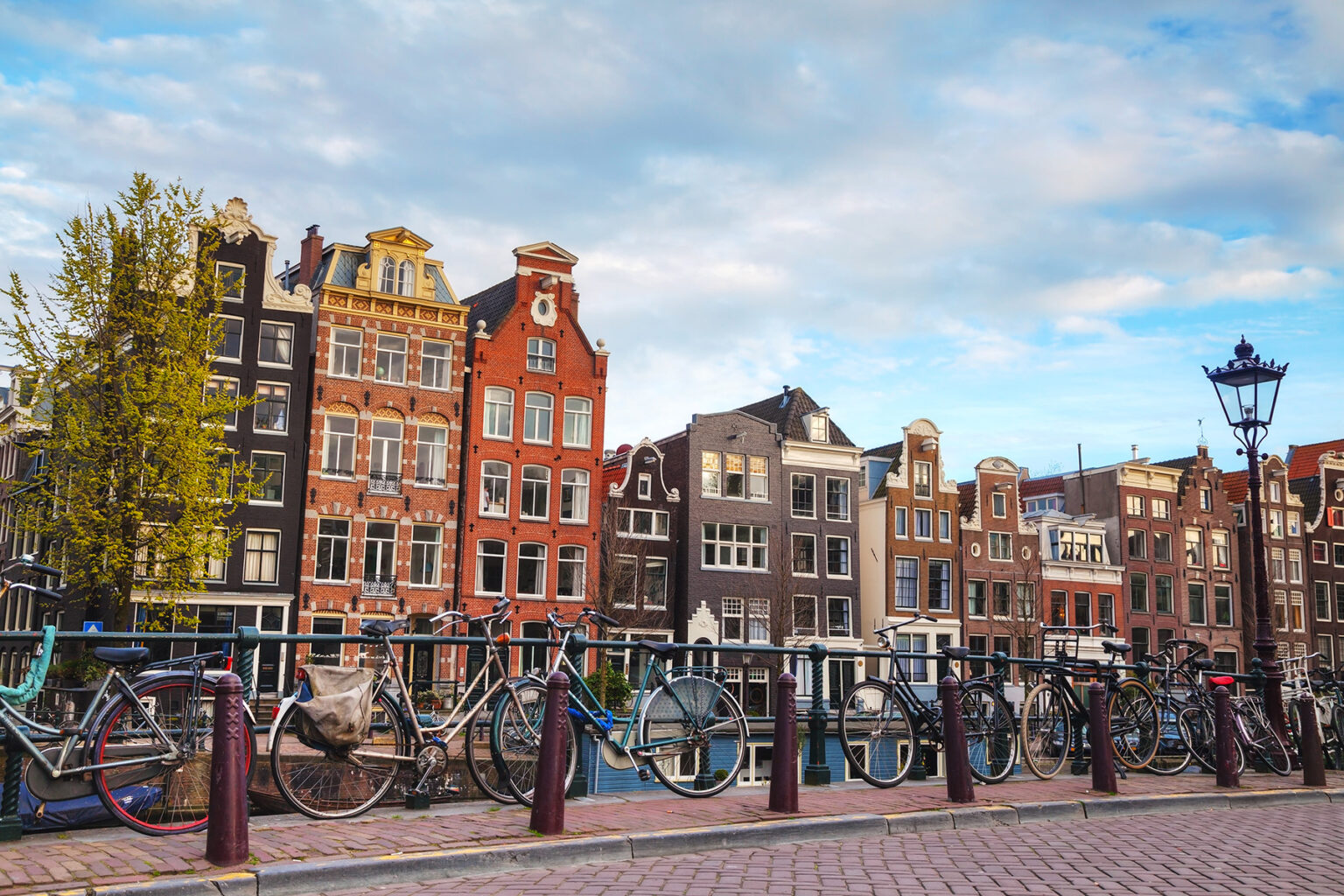The Netherlands is a popular country for expats, known for its tolerant society and high standard of living. The capital, Amsterdam, is a charming canal city that attracts many international workers to its growing tech and finance industries. Other cities are also home to significant expat communities, including The Hague and Rotterdam.
If you’re planning on moving to the Netherlands, there are certain things to be aware of before you make the move. These include a range of issues, from visa requirements to the Dutch cycling lifestyle. To help you out, here’s our checklist for moving to the Netherlands, including information on the following topics:
The Relocator
Wherever you’ll be living and working in the Netherlands, take the stress out of your move by letting The Relocator find the right international shipping options for you. Compare a number of trusted international movers and get a free quote in minutes. Wherever Dutch life takes you, get there with The Relocator.
Do your research
If you think of the Netherlands, you probably picture canals, bikes, and perhaps the odd windmill. However, if you’re planning on moving to the Netherlands, it’s essential you take a closer look at what everyday life is like in the country. Generally speaking, Dutch society is tolerant and outward-looking, but the cost of living can be high, particularly in larger cities like Amsterdam and Rotterdam. However, the Netherlands is relatively small, and good transport links mean the whole country is well-connected for commuters living further afield.

To give you an idea of what to expect in your new home, make sure you read our guides on the following topics:
Arrange your visa
Do you know the immigration requirements for you and your family when moving to the Netherlands? The Netherlands is an EU member state, meaning EU/EFTA residents can enter and remain in the country without requiring a visa. Any EU/EFTA residents staying longer than four months will need to register with the government. Other requirements exist for non EU/EFTA residents, including the need for entry visas and residence permits. For more information on this and all aspects of Dutch immigration, read our complete guide to Dutch visas.
Transport your belongings
The Dutch might be a cycling nation, but it’s unlikely you’ll be able to move your belongings to your new home on the back of your bike. However, if you’re planning on moving to the Netherlands, it’s important to understand how you’re going to transport your belongings. This can be a stressful process, which is why many expats use relocations specialists to help out.

Relocation specialists can help you with every step of your move to the Netherlands, from storing your household items to helping you find the right school for your children. Alternatively, you might simply need to arrange some international shipping. Whatever you’re looking for, the following relocation companies can help with your more to the Netherlands:
For more information on how you can use these services, read our guide to relocation options for moving to the Netherlands.
Manage your finances
When moving to the Netherlands, it’s essential your finances are in order to ensure you can support yourself and your family. If you’re looking to budget your finances after moving or considering a mortgage, check out the ING products designed specifically for expats.
You may want to take the following into account when moving to the Netherlands:
- Bank accounts: Research your banking options before you arrive, including traditional banks and mobile banking options. It’s possible you can open a mobile bank account before you arrive. For more information, read our guide to opening a bank account in the Netherlands.
- Pensions, tax, and investments: Can your pension be transferred to the Netherlands? Will your investments be affected by your relocation? Find out before you move with our guide to the Dutch tax system and our guide to Dutch pensions.
- Insurance: Whatever your needs, make sure your family’s belongings have the protection they need by sorting out insurance premiums before you leave. For more information, read our guide to insurance in the Netherlands.
To help cover your finances in the short-term, you may also need to transfer money internationally quickly and easily. To do this, check out these international money transfer options:
- CurrencyFair offers money transfers to over 150 countries and has exchange rates up to eight times cheaper than the banks, helping you avoid excessive bank fees.
- Wise is an international money transfer provider. The service is available in 59 countries and offers transfers between cross-border bank accounts up to eight times cheaper than traditional banks.
- XE allows you to view live exchange rates for currencies worldwide. They also allow individuals and businesses to make international money transfers for low fees.
Move your vehicle
How do you plan to get around in the Netherlands? If you’re thinking about taking your car with you, you’ll need to read up on local motoring laws before you move. You should also consider whether you’ll actually want to use your car once you’ve moved. In Amsterdam, for example, car parking is expensive and inaccessible. In addition, with good cycling and public transport links across the country, you may prefer to use other options. However, if you do you plan to use a car anyway, read our guide on driving in the Netherlands.
Take care of your pet
Does your family include some four-legged friends? Make sure they’re able to join you in your new home by researching the restrictions on pets. The Netherlands may have restrictions on animals that you’re not used to, so check the situation early to avoid delays and disappointment later on. For more information, read our guide on bringing a pet to the Netherlands.
Sort out health insurance
One of the most important things to prepare when moving to the Netherlands is health insurance for you and your family. The Dutch healthcare system is one of the best in the world, and residents are required by law to take out health insurance, including most expat residents.

The range of health insurance options in the Netherlands can seem daunting for expats, with many companies offering what seem like similar options. So, take the stress out of finding cover by researching health insurance providers before you move, including:
For more information on getting Dutch health cover, read our guide to health insurance in the Netherlands.
Find somewhere to live
The Netherlands has a whole host of housing options for expats. Do you want to live in a typical Amsterdam canal house? Maybe a houseboat in Haarlem? Or perhaps a modern waterfront apartment in Rotterdam? In the Netherlands, there’s something for every taste and budget. You can find homes to rent on sites such as:
Once you’re in, remember to sign up for home contents coverage to give yourself peace of mind. Check out Centraal Beheer to see your options ahead of time. Why not start the search early before you’ve even set foot in your new home? For more information, read our guide to housing in the Netherlands.
Start looking for a job
Many expats moving to the Netherlands will already have a job offer in their back pocket. However, others will make the move while still looking for a job. The Netherlands has plenty of job opportunities for expats, particularly in the tech and finance sectors. However, remember that your employment chances will be limited if you don’t speak Dutch. For more help and guidance, read our guide to finding work in the Netherlands.
Look into childcare and schooling options
Are you making the move to the Netherlands with kids? Give them the best start in their new country by choosing the right childcare and school. The Dutch education system may be different from the one you’re used to, so it pays to do your homework.

Do you want your children to attend a kinderopvang (daycare center) close to home, so they can learn Dutch and prepare to attend local schools? Or maybe you’d prefer to enroll them in an international school, where they can study for the international baccalaureate or GCSE? Many of these schools also offer early year programs for the little ones, such as:
Learn the language
English is generally widely spoken in the Netherlands. However, if you’re planning to live in the country, you’ll soon find out just how important it is to learn Dutch. From official documents to finding a job, learning at least a basic level of Dutch makes a big difference when it comes to integrating into society. So, make life a little easier by starting to learn Dutch before you even move.
Your first week in the Netherlands
Everything planned for your move to the Netherlands? Now, you need to make sure you hit the ground running when you arrive in your new home. To help you out, read our guide to your first week in the Netherlands.
Useful resources
For more helpful information and guidance on moving to the Netherlands, check out these websites:
- iamsterdam – local government information site for expats
- government.nl – immigration information from Dutch central government








